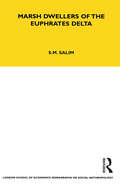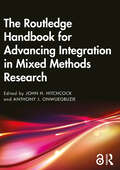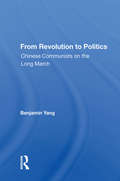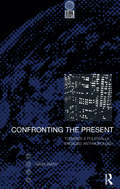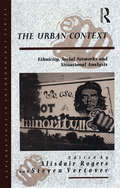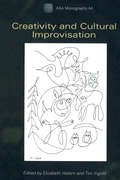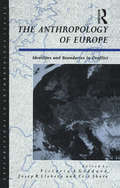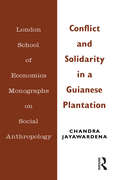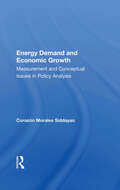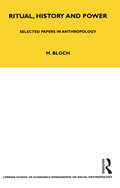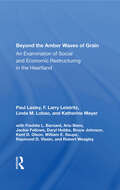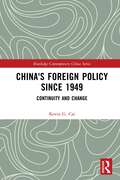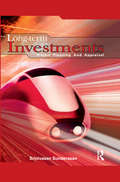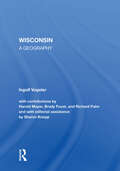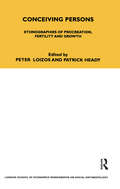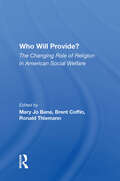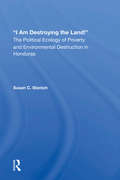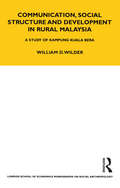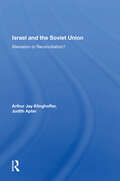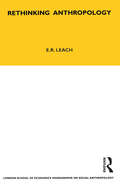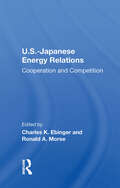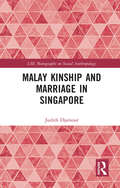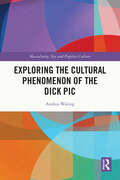- Table View
- List View
Marsh Dwellers of the Euphrates Delta (LSE Monographs on Social Anthropology #Vol. 23)
by S. M. SalimDr Salim, of Bagdad University, spent two years amongst the remarkable tribal peoples who inhabit the great marshes of the lower Euphrates. He describes their social and economic organization and discusses on the one hand the process by which people with bedouin traditions and values have adapted themselves to different and difficult conditions, and on the other the effects upon them of submission to the central government and the modernisation of their modes of life that has resulted from it. His account offers a fascinating study of people living in an unusual environment, and will be of value to the anthropologist and ethnologist for its precise ethnography. At the same time, as one of the few detailed studies of the changes now being wrought on such a large scale by modern economic and political forces, it has real importance for the general student of contemporary Middle Eastern affairs.
Choice and Change: Essays in Honour of Lucy Mair (LSE Monographs on Social Anthropology #No. 50)
by J. DavisThis volume in honour of Professor Mair reflects the range of her interests, and those of the Department in which she taught, in many areas of social anthropology, for it reports on research in Africa, Asia and the Mediterranean, on the tensions between tradition and modernity, between the individual and society, deviance and conformity, stability and conflict. The ambiguities of social change and the choices thus presented to individuals are examined in all the essays and issues of modem politics and development dominate most of them.
The Routledge Handbook for Advancing Integration in Mixed Methods Research
by John H. Hitchcock Anthony J. OnwuegbuzieThis groundbreaking edited book, The Routledge Handbook for Advancing Integration in Mixed Methods Research, presents an array of different integration ideas, with contributions from scholars across the globe. This handbook represents the first major volume that comprehensively discusses this topic of integration. Perhaps the most fundamental and longstanding question in mixed methods research is: How does one best integrate disparate forms of information to produce the best form of inquiry? Each of the 34 seminal chapters in this handbook accelerates the discussion of integration across a broad range of disciplines, including education, arts-based analyses, and work in the Global South, as well as special topics such as psychometrics and media research. Many of the chapters present new topics that have never been written about before, and all chapters offer cutting-edge approaches to integration. They also offer different perspectives of integration – leading the introductory chapter to offer a new and comprehensive definition for integration, as follows: "referring to the optimal mixing, combining, blending, amalgamating, incorporating, joining, linking, merging, consolidating, or unifying of research approaches, methodologies, philosophies, methods, techniques, concepts, language, modes, disciplines, fields, and/or teams within a single study." The concluding chapter offers a meta-framework that accounts for this definition and is designed to help scholars think more about integration in a way that represents a continuous, dynamic, iterative, interactive, synergistic, and holistic meaning-making process. This handbook will be an essential reference work for all scholars and practitioners using or seeking to use mixed methods in their research.
From Revolution To Politics: Chinese Communists On The Long March
by Benjamin YangProviding fresh analysis of the history and politics of Chinese communism, this book utilizes previously inaccessible sources to reassess the epic Long March. It sheds new light on the revolutionary momentum and political structure of the Chinese Communist Party in the 1930s.
Confronting the Present: Towards a Politically Engaged Anthropology (Global Issues #2)
by Gavin SmithAnthropologists study other people and worry about it. In the past this took the form of a professional desire to make our politics always somewhere else and to do with persons characterized as in some way different from ourselves. Now distances shrink and old forms of difference melt as global forces give rise to new processes of differentiation and new possibilities for political collectivities. How does this affect the way we might design a politically relevant anthropology? This book examines these concerns in light of the author's shift from the study of rather distant people to people and places closer to home - a trend to be found within the discipline as a whole. How should anthropology respond to this change, as it increasingly finds itself in stamping grounds where other disciplines are already well-entrenched? How will work being done in anthropology intersect with that in other disciplines? Will anthropologists have anything to offer debates that have been ongoing in these other disciplines, such as those relating to social citizenship and collective identity, regionalism and the constitution of space and place, hegemony and resistance, political organization and cultural expression? Conversely, what can anthropologists learn from the way other disciplines formulate these issues and problems?Written to provoke discussion, this timely book aims to initiate a dialogue not only with anthropologists, but also with those in related disciplines who share a concern with people, politics and modernity. As well as anthropologists, the issues it tackles will be of interest to geographers, economists, political scientists, social historians and sociologists.
The Urban Context: Ethnicity, Social Networks and Situational Analysis (Explorations In Anthropology Ser. #22)
by Alisdair RogersAddresses issues of current social and theoretical concern such as urban ethnic conflict, multiculturalism and immigration.How do people make sense of their lives amid the social and cultural diversity of cities? The essays in this volume argue that a powerful and related set of methodologies - including comparative research, the ethnography of situations such as dances and parades, and social network analysis - can further our understanding of the intertwined processes of ethnicity and community, class and gender. Written by leading researchers from a number of disciplines, these essays demonstrate a sensitivity to places and contexts ranging from Los Angeles to Queensland. Students of anthropology, geography and urban studies will find this book an invaluable guide to the intricacies of urban social life in the late 20th century.
Creativity and Cultural Improvisation (Asa Monographs)
by Elizabeth HallamThere is no prepared script for social and cultural life. People work it out as they go along. Creativity and Cultural Improvisation casts fresh, anthropological eyes on the cultural sites of creativity that form part of our social matrix. The book explores the ways creative agency is attributed in the graphic and performing arts and in intellectual property law. It shows how the sources of creativity are embedded in social, political and religious institutions, examines the relationship between creativity and the perception and passage of time, and reviews the creativity and improvisational quality of anthropological scholarship itself. Individual essays examine how the concept of creativity has changed in the history of modern social theory, and question its applicability as a term of cross-cultural analysis. The contributors highlight the collaborative and political dimensions of creativity and thus challenge the idea that creativity arises only from individual talent and expression.
The Anthropology of Europe: Identities and Boundaries in Conflict (Explorations In Anthropology Ser.)
by Victoria A. GoddardThis is the first study of Europe post-1989 from an anthropological perspective. Thirteen distinguished authors examine the social, cultural and political implications of European integration with particular emphasis on changing European identities, concepts of citizenship and levels of participation. Their aim is to suggest an agenda for future research capable of addressing developing trends in contemporary Europe. The book is divided into two parts. The first deals with major theoretical issues that have characterized the anthropological study of Europe and includes a detailed introductory chapter which charts the history of anthropology in Europe and considers the prospects for an anthropology of Europe. This is followed by key themes in the study of European society and culture including kinship, gender, nationalism, immigration and changing patterns of production. The second section develops these themes further using different theoretical perspectives to explain complex issues such as nationalism, ethnic identities, and sectarian conflicts. Nine case studies cover a wide range of contemporary topics including European integration and Irish nationalism, the transmission of ethnic identity, and identity and conflict in the former Yugoslavia and post-colonial Gibraltar. This book fills a gap in the literature on European integration and will be of interest to anthropologists and sociologists as well as students of Political Science, Communications and European Studies.
Conflict and Solidarity in a Guianese Plantation (LSE Monographs on Social Anthropology #Vol. 25)
by Chandra JayawardenaThis study concerns two communities of sugar plantation labourers, the descendants of indentured immigrants from India, who live in the county of Berbice, British Guiana. The study is focused on the analysis of social conflict: the factors that cause it, the forms it takes and its social consequences.
Energy Demand And Economic Growth: Measurement And Conceptual Issues In Policy Analysis
by Corazon M SiddayaoThe author examines the measurement and conceptual issues that complicate analytical work in the energy demand field. Successful policy decisions depend on the use of appropriate data and analytic methods; because the demand side of the energy-economy interaction is highly complex, this study focuses on the more basic economic and energy concepts and methods in demand analyses. He critiques measures used to analyze the relationship of energy to economic growth and summarizes the various demand estimation methods and their results. Highlighting the problems faced by analysts in developing countries who often have limited time and inadequate data, she discusses the serious implications of basing policy decisions on questionable analytic methods and data.
Chinese Lineage and Society: Fukien and Kwantung Volume 33 (Monographs On Social Anthropology #No. 33)
by Maurice FreedmanThis book takes the argument first set out in Lineage Organization in South-Eastern China a step further. It incorporates some of Professor Freedman's field data (gathered in the Hong Kong New Territories in 1963) and draws on a wide variety of written sources. As in his first book on the subject, the author seeks to analyse certain crucial institutions of Chinese society within the framework of contemporary anthropological theory.
Ritual, History and Power: Selected Papers in Anthropology (London School Of Economics Monographs On Social Anthropology Ser. #Vol. 58)
by Maurice BlochThis volume provides a collection of some of Maurice Bloch's most important work, including influential essays on power, hierarchy, death and fertility.
Beyond The Amber Waves Of Grain: An Examination Of Social And Economic Restructuring In The Heartland
by Paul LasleyThis book explores the large-scale impacts of economic restructuring in the Midwest in response to the 1980s farm crisis. Drawing upon detailed surveys from twelve north-central states, the authors offer a comprehensive view of farm restructuring and its social, economic, and political consequences. The study goes beyond the farm gate to look at the broader implications of those changes for agriculture policy, related industries, and areas still dependent upon farming, contributing to the literature on economic restructuring. Like the factory closings in the Rust Belt, the dramatic failure of agricultural industries in the Farm Belt has caused fundamental changes in the organization and control of production. The impact of job losses and economic depression and the shattering of a way of life have shaken public complacency about the stability of many fundamental American myths. Beyond the Amber Waves of Grain looks at the farm crisis not as a purely agricultural, nonurban issue but as one that adds to our understanding of the overall social impacts of economic change. The book takes up the story of Midwestern farm enterprises in the wake of the farm crisis of the 1980s. Using data drawn from detailed surveys of 3,940 farm households in twelve north-central states, the authors offer a comprehensive view of the social and economic restructuring of agriculture and explore the consequences for farm enterprises, farm households, and farming communities. The study goes beyond the farm gate to look at the broader implications for related industries and communities dependent upon farming, for agricultural and rural policies, and for farm women and men, contributing to the literature on economic restructuring and its outcomes.
China's Foreign Policy since 1949: Continuity and Change (Routledge Contemporary China Series)
by Kevin G. CaiThis book provides a systematic and comprehensive analysis and overview of China’s foreign policy since 1949. It starts with constructing an analytical framework for explaining Chinese foreign policy and then, on the basis of that, outlines and analyzes developments in different areas of foreign policy – such as security policy, international economic policy and policy toward multilateralism – and foreign policy toward different areas of the world – such as the United States, East Asia, Europe and developing countries. The book also examines decision-making in Chinese foreign policy, discusses issues of current concern, including maritime disputes, Xi Jinping’s more assertive approach to foreign policy, the One Belt One Road initiative and the trade war with the United States. The book concludes with a comparative analysis of the three phases of China’s foreign policy since 1949 and provides a brief assessment of how China’s foreign policy is likely to develop going forward.
Long-Term Investments: Project Planning and Appraisal
by Srinivasan SundarasanFirst published in 2009. The limited text material available to highlight the relationships among capital structure, managerial incentives and valuation has also constrained teaching efforts at business schools. Long-term Investments is intended to give a bird’s eye view of projects for a diverse audience encountered at contemporary business schools. This book is an attempt to blend the theory from Corporate Finance courses with the real-world situations encountered by a project analyst. It provides a systematic ‘guided-tour’ of the world of projects commencing with a strategic view, through the development of financial models and culminates with an evaluation of risk and the design of risk-mitigation measures. Given the emphasis on the development of financial models to help make investment decisions, it is designed to simultaneously appeal to business school students and to serve as a do-it-yourself guide for practicing professionals.
Wisconsin: A Geography
by Ingolf VogelerOriginally published in 1980, Wisconsin: A Geography is a thematic study of the physical, cultural, and economic geography of the state. It is illustrated with Black and White photos, maps, architectural drawings, and economic charts. The book is a valuable survey of the state's regions.
Conceiving Persons: Ethnographies of Procreation, Fertility and Growth Volume 68 (Lse Monographs On Social Anthropology Ser. #Vol. 68)
by Peter LoizosThe Monographs on Social Anthropology were established in 1940 and aim to publish results of modem anthropological research of primary interest to specialists. This volume provides an international analysis of the core metaphors and practices of human sexual and social reproduction in their personal, social and cosmological contexts.
Who Will Provide? The Changing Role Of Religion In American Social Welfare
by Mary Jo BaneLeading scholars examine how the church, community organizations, and the government must work together to provide for America's poor in the aftermath of welfare reform. . Who will provide for Americas children, elderly, and working families? Not since the 1930s has our nation faced such fundamental choices over how to care for all its citizens. Now, amid economic prosperity, Americans are asking what government, business, and non-profit organizations can and can’t do and what they should and shouldn’t be asked to do. As both political parties look to faith-based organizations to meet material and spiritual needs, the center of this historic debate is the changing role of religion. These essays combine a fresh perspective and detailed analysis on these pressing issues. They emerge from a three-year Harvard Seminar sponsored by the Center for the Study of Values in Public Life that brought together scholars in public policy, government, religion, sociology, law, education, and non-profit leadership. By putting the present moment in broad historical perspective, these essays offer rich insights into the resources of faith-based organizations, while cautioning against viewing their expanded role as an alternative to the government’s responsibility. In Who Will Provide? community leaders, organizational managers, public officials, and scholars will find careful analysis drawing on a number of fields to aid their work of devising better partnerships of social provision locally and nationally. It was named a Choice Outstanding Academic Book of 2001..
I Am Destroying The Land!: The Political Ecology Of Poverty And Environmental Destruction In Honduras
by Susan C StonichThis book is about interconnections-those among the historical, geographic, demographic, social, economic, and ecological aspects of development-as well as how Central Americans struggle with the interplay of increasing poverty and environmental degradation. Centering on the case of southern Honduras and expanding to include the Central American region, Susan Stonich's analysis employs an integrative approach that builds on a strong and varied methodological foundation to encompass both political economy and ecology. Stonich examines the systemic linkages among the dynamics of dominant development models and associated patterns of capitalist accumulation, regional demography, rural impoverishment, and environmental decline. By casting the discussion against the backdrop of southern Honduras, she presents a powerful historical record of how larger socio-political communities impact individuals and the natural environment and how, in turn, people respond. She charts the destiny of peasant groups within the dynamics of contemporary capitalism, recognizing that the fates of the peasantry and the natural environment are intimately linked. Stonich's study contributes to an improved understanding of the complex interrelationships between social processes and environmental degradation, offering a timely and pertinent comment on one of the most serious modern challenges
Communication, Social Structure and Development in Rural Malaysia: A Study of Kampung Kuala Bera
by William WilderThis is an important innovative analysis of communication and society in Pahang, West Malaysia, based on fieldwork carried out in Kampung Kuala Bera. Dr Wilder is concerned with communication networks of all kinds as found in a long-established Malay village, including the uses of language, small-scale (kinship and village-based) networks, and higher-level systems (the district and the nation as a whole). Dr Wilder lays particular emphasis on the role of communication in the process of economic development and on administration during a period of rapid and induced social change. His study is prefaced by a detailed historical account of Pahang and a thorough sociological analysis of Kampung Kuala Bera. The ethnography is meticulously detailed; its special contribution includes the first-ever publication of a Malay village genealogy, a systematic account of birth-order names (a major feature of the kinship system), complete figures on marital breakdowns for the whole village population, and an intensive analysis of leadership in its local context. This work will be of value to students of Southeast Asian societies, rural sociology, network studies, economic development, political education and the mass media in third world countries.
Israel And The Soviet Union: Alienation Or Reconciliation
by Arthur J KlinghofferThis volume is a survey of Soviet-Israeli relations from the time when the U.S.S.R. supported the establishment of Israel's independence in 1947-48. Although diplomatic relations have been broken since 1967, the author shows how many contacts there have been, from conversations at the foreign minister level to the visits of individuals and delegations.
Rethinking Anthropology: Volume 22 (LSE Monographs on Social Anthropology #22)
by E. R. LeachA collection of brilliant and provocative essays from Edmund Leach, one of the most original voices in the social anthropological tradition.
U.S.-Japanese Energy Relations: Cooperation And Competition
by Charles EbingerOriginally published in 1984, this collection of original papers highlights the major problems and challenges that lie ahead in U.S.-Japanese energy relations. Energy cooperation, both through joint projects and bilateral planning, has become an important barometer of the U.S. diplomatic relationship with Japan, as evidenced by the high-level U.S.-Japan Energy Working Group set up in January 1984 following Prime Minister Nakasone's visit to Washington. Contributions to this book detail the problems posed by energy security differences and uncertain oil markets; U.S. crude oil exports to Japan; and nuclear, coal solar-energy; and they consider the prospects for conflict over investment in Siberia and Asia
Malay Kinship and Marriage in Singapore (LSE Monographs on Social Anthropology #Vol. 21)
by Judith DjamourDr Djamour spent two years in Singapore, both in the city and in a Malay fishing village, and her first-hand account draws a lively and sympathetic picture of behaviour within the family and between kinsmen. It is nonetheless an important contribution to social anthropology and discusses, as its central topic, the instability of Malay marriage. The causes and consequences of this phenomenon, which involve social, economic, and psychological considerations, are analysed in some detail. The social picture which emerges has wide validity throughout the country and should prove of value to all who seek a fuller knowledge of Malay society.
Exploring the Cultural Phenomenon of the Dick Pic (Masculinity, Sex and Popular Culture)
by Andrea WalingThis book explores the dick pic in popular culture. Drawing from a range of disciplines, cultural analyses, lived experiences and theoretical approaches, this book explores the polysemous nature of dick pics. It looks at historical and contemporary theorisations of the penis/phallus, sexualisation and sexual objectification of the male body arguments, contemporary public discourses concerning the dick pic, and men’s lived experiences of sexting and dick pic sending. Made possible by advances in mobile and digital technologies, the dick pic is often regarded as a harmful endemic, particularly in the wake of increased recognitions of sexual violence against women. However, very little has been done to explore dick pics outside of violence, pathological, and moral panic framings, such as the erotic possibilities and understandings of the dick pic, and the way certain discourses continue to work to shape and frame how we engage and understand the dick pic in contemporary culture. This will be key reading for scholars and students in Women’s and Gender Studies, Sexuality Studies, Masculinity and Sociology.
